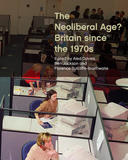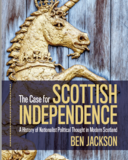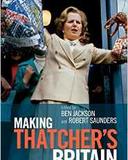Professor Ben Jackson
My research focuses on the role of ideas in political and policy debates in the twentieth century, chiefly in the UK but I have also written about the United States and continental Europe. I have worked on three main projects. First, the political thought of socialism and liberalism in Britain across the twentieth century, especially my first book, Equality and the British Left (2007), which investigated the debates about economic inequality that lay behind the rise of the welfare state. Second, the political and economic ideas of the neo-liberal right from the mid-twentieth century onwards. I am interested in both the transnational networks that generated neo-liberal theory and the emergence of Thatcherism in the UK. With Robert Saunders, I co-edited Making Thatcher’s Britain (2012), which was an early attempt to historicise the Thatcher government. I have also co-edited (with Aled Davies and Florence Sutcliffe-Braithwaite) The Neo-Liberal Age? Britain Since the 1970s (2021), which debates how useful the concept of ‘neo-liberalism’ is for understanding recent British history. Third, I have worked on Scottish history, focusing on the history and politics of Scottish nationalism. This led to my second book, The Case for Scottish Independence: A History of Nationalist Political Thought in Modern Scotland (2020), which traces the evolution of Scottish nationalist ideology from the interwar period to the 2014 referendum on Scottish independence.
I teach undergraduate papers in modern British history and the history of political thought. I supervise Masters and DPhil students working on topics in modern British political history, twentieth-century British social and economic policy, and the history of modern political and economic thought. I am happy to hear from prospective research students interested in working in these fields.
I am the Co-Editor of Political Quarterly and I serve on the Editorial Advisory Boards of the Journal of British Studies; Renewal; and Twentieth Century British History. Within the university, I am a convener of the Political Thought Seminar and of the Modern British History Seminar.
Research Interests
- The rise of the neo-liberal right and Thatcherism
- The political thought of British liberalism and socialism
- The history and politics of Scottish nationalism
- The history and politics of the Labour Party
- Twentieth century British social and economic policy
Featured Publications
The Case for Scottish Independence: A History of Nationalist Political Thought in Modern Scotland (CUP, 2020)
Equality and the British Left: A Study in Progressive Political Thought, 1900-64 (Manchester University Press, 2007)
Making Thatcher’s Britain (Cambridge University Press, 2012), co-edited with Robert Saunders
In the Media
The Case for Scottish Independence: A History of Nationalist Political Thought in Modern Scotland
Great Thinkers: Beatrice Webb FBA
In 1931, the British Academy elected its first female fellow, Beatrice Webb. A sociologist, economist and social reformer, she was one of the four founders of the London School of Economics. In this episode, Professor Jose Harris FBA and Dr Ben Jackson take a closer look at Webb’s extraordinary life and legacy.
17 June 2019
https://share.transistor.fm/e/149b71fa
Current DPhil Students
Teaching
I would like to hear from potential DPhil students regarding:
- Modern British political history
- Twentieth century British social and economic policy;
- The history of modern political and economic thought
I currently teach:
|
Prelims |
FHS |
|
History of the British Isles 1815-1924 |
History of the British Isles 1815-1924 |
|
History of the British Isles Since 1900 |
History of the British Isles Since 1900 |
|
Theories of the State |
The Making and Unmaking of the United Kingdom |
|
Approaches to History |
Political Theory and Social Science, c. 1780-1920 |
| War and Reconstruction: Ideas, Politics and Social Change, 1939-45 | |
| Disciplines of History |








